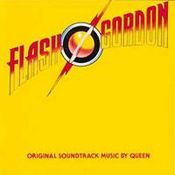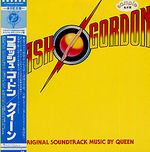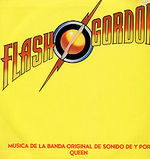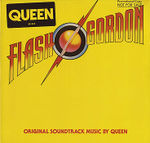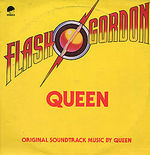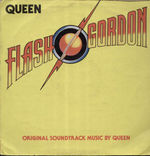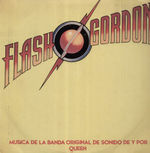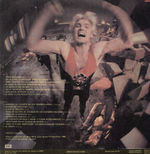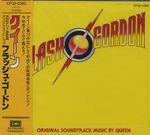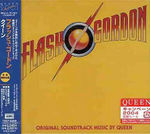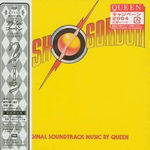From Queenpedia.com
Tracklists
History
During preliminary sessions for The Game in the summer of 1979, Queen were approached by Italian director Dino de Laurentiis, slated to direct a film adaptation of the 1930s comic hero, Flash Gordon. When he was recommended to use Queen to provide a soundtrack for his film, the director infamously cried, "But who are the queens?" The band were understandably skeptical about delving into the world of film music, but were more receptive when they were given complete artistic freedom, as long as the music complemented the scene. Brian took a particular interest in the project, and worked closely with Mack on the production duties. For the first and only time on a Queen album, an individual - in this case, Brian - was co-credited as producer instead of Queen as a collective unit, which was pointed out by John in a 1981 interview as being a "very unusual thing for us, and we got [in] some trouble with it. Brian wanted to have a German producer, with whom he worked very closely in Munich, while we would have preferred an album from Queen. We did agree then, but were not very happy about it."
Demo sessions took place concurrently with recording sessions for The Game in the beginning of 1980, though it wouldn't be until a break in the band's touring schedule in October 1980 that they would be able to work on the project properly. Because of the short span of time (six weeks) they allowed themselves, sessions were often done separately and as individuals instead of as a band unit. To underscore the sci-fi feel of the film, the band used synthesizers more prominently than they had on The Game, with nearly every track using it as the lead instrument; because of this, sections of the album sound a lot like David Bowie's "Berlin trilogy" (Low, "Heroes", and Lodger), though while those albums have gone on to become classics and the template for which Bowie's albums would be judged upon, Flash Gordon remains the black sheep in Queen's discography.
Perhaps part of the band's mistake was issuing the soundtrack as a proper Queen album instead of a companion piece to the film. Once in the annals of Queen's discography, it's inevitable that the album is compared to previous albums and, because of the nature of the album (eighteen pieces of music, most barely over two minutes, and only two real songs - Flash's Theme and The Hero, which bookend the album - featuring any lead vocals from Freddie), as well as the reputation of highly camp film, it wasn't able to stand a chance. Critics were more than ready to rip into the band, while fans weren't sure what to make of it; because of this, the album only reached #10 in the UK, and a dismal #23 in the US, the first time since Queen II that a Queen album failed to reach the Top Twenty. Considering the success of The Game mere months prior, the relative failure of the album must have alarmed the band.
However, there are some fine pieces of music on the album, and, if one can get past the absurdly cheesy bits of dialog that pepper the songs, stands as a highly experimental and enjoyable listening experience. The synthesizers create a darker effect, and there are even moments of true beauty: John's stark Execution Of Flash leads effortlessly into Freddie's tour de force, The Kiss (Aura Resurrects Flash). Only the repetition of the thumping main theme spoils the effect somewhat, especially on the second side.
In 1991, the album was remastered by Hollywood Records, with a particularly offensive and downright boring remix of Flash's Theme tacked on as a bonus track. Because there were no known outtakes from the sessions (except for a piece titled The Dark which would later be issued as the introduction piece of Brian's first proper solo album, Back To The Light, as well as incidental pieces that would later be incorporated into Roger's Fun In Space album in 1981), it's hardly surprising the dearth of bonus material, but an awful rap remix of the main theme detracts from the spirit and fun represented in the movie.
Credits
- Musicians:
- John Deacon - bass guitar, synthesizer, guitar
- Brian May - guitars, vocals, piano, organ, synthesizer
- Freddie Mercury - vocals, piano, synthesizer
- Roger Taylor - drums, percussion, vocals, timpani
- Howard Blake - orchestral arrangements
- Recorded: October - November 1980 at The Townhouse and Advision Studios, London; The Music Centre, Middlesex. The Hero recorded at Utopia Studios, London. Orchestrations recorded at Anvil Studios, Denham.
Charts
- #10 (UK), #23 (US).
Liner notes
- Notes
Additional info
- Info
Reviews
- Reviews
